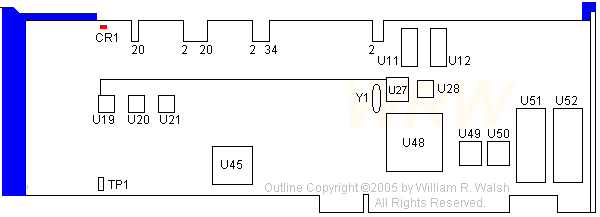Core MCK 15/20MHz ESDI/ST-506 (?) Adapter - @0500
0500.ADF
Utilities Diskette (standard 1.44MB disk image, use RAWRITE or WinImage to extract..)
ZIP file, containing the same contents as the disk image.
8580-A31 Experiences
"Whatever Happened To..."
NOTE: As of this writing, the ADF
available here is one of the few complete and correct ones available.
UZnal's MCAbase has another, but I haven't tested it. Look here if you want to try that ADF...

Components:
U11, 12 - Mosel MS6264AL-45SC
U19, 20, 21 - Labeled as '6002', '6004', and '6010', respectively.
U27, 28 - Labeled as '6001' and '6007', respectively.
U45 - National Semiconductor DP8456V-8
U48 - SMC 94C18 (dated 6/90?)
U49, 50 - Labeled as '6005' and '6006, respectively.
U51 - MCK BIOS ROM A Version 2.11
U52 - MCK BIOS ROM B Version 2.11
CR1 - Red surface mount LED (comes on during most drive activity)
Y1 - 20.000MHz
TP1 - Not sure..."test point 1"?
The black line indicates a soldered black wire rework of some kind.
Handwritten over the "Rev C" notice on the card is a "Rev D"...perhaps
the rework has something to do with this? I'm not sure what it would
affect. Upon powering up, this adapter displays the type of both
drives. The ROM chips on it have strings inside pertaining to ST-506
drives and the utility diskette has utilities for ST-506.
The SMC 94C18 is a Standard Microsystems MCA controller. SMC actually
responded to my request for info, but they couldn't find anything on
the part. Apparently it was just too old for them to have kept the
documentation available on it. They did, however, make an effort to
look for more info.
The DP8456 is a "disk controller" as per National Semiconductor. They did not return a response to my request for info.
The lower numbered ends of each connector above indicate the location of pin 1.
Experiences In An 8580-A31
As far as I can tell, the Core adapter appears to have been designed
for systems that are much slower than the 25MHz variant of the 8580.
All of the following testing was done under MS-DOS 6.22.
The system this adapter came with also had a 486 MCMaster card
installed. With the MCMaster installed, reliable operation of the
computer could not be obtained. All of the CORE adapter and MCMaster
settings were tried in an effort to obtain reliable operation. Behavior
in the various configurations ranged from random lockups, boot failure
or even loss of all data and formatting of the boot drive.
The MCMaster card was removed and reliable operation of the disk subsystem was the immediate result.
Still hoping to use an upgrade, I tried to use an IBM "Blue Lightening"
486 upgrade. This upgrade is installed in place of the 386DX CPU.
Because it replaces the main CPU, this upgrade could potentially
resolve any 'bus hogging' issues that adapters on the MCA bus might
experience. With this upgrade, the computer would boot but it froze the
system up solid early on in the boot process. No data was lost during
this test. Because I had a good working setup at this point, I did not
try to adjust any switch settings on the Blue Lightening.
It appears that this adapter may be pushed to its limits in faster PS/2s. As a precaution, you should make a backup of your data before you upgrade your CPU. This
adapter may not like such an upgrade. In my experience, you will know
very soon if the disk controller cannot handle your CPU upgrade. Avoid
a disaster and think before you upgrade!
Whatever Happened To...
Core International? After some digging around in the CSIPH archives,
and more searching from that point onward, I have a pretty good idea.
Sometime in the late 1990s, Aiwa America (yes, the same Aiwa that sells
audio equipment) swallowed Core International and renamed it to Aiwa
Data Product Services. Archives of the Aiwa web site show this
name--and the Core International logo--being in use. Later they became
known as the Aiwa Computer Systems Division. This division sold tape
backup drives and disk array systems. I saw no disk controllers or
standalone hard drives being offered for sale.
A general search of newsgroup postings seems to reveal that Aiwa
shut down their Computer Systems Division on October 31st, 1999. Reason
for the closure of this division seems to have been a result of Sony
Corporation's competing products along with a 50% stake in the company.
Today Aiwa's web site has no information on their computer products.
I wasn't able to find any record of a company that may have picked
up the rights, support and documentation for Aiwa's computer products.
If you know what (if any) company might have picked these things up,
please do let me know!
Go Back>
Copyright © 2005-2006 by William R. Walsh. All
Rights Reserved. This page may be reproduced freely in its original
form with all copyright noticies present and unaltered as long as no
charge is assessed for providing this information, other than
reasonable charges for duplicating, media cost, or connection/access
time.
